Oh God! (1977, 1980, 1984)
It's rather amazing that a little under half a century ago, one studio executive said to another, “I think we can make a movie star out of John Denver.”
Hey, nothing against the guy. When “Country Roads” or “Thank God I’m a Country Boy” come on the radio, I happily sing along. But he wasn’t much of an actor or comedian.
Denver’s limitations didn’t keep 1977’s Oh God! from being a hit, though. It even knocked Star Wars out of the top spot for a week, but the film’s success can probably be attributed to the comic gifts of then-octogenarian George Burns and the high concept of "what would happen if God visited an ordinary guy."
With a screenplay by Larry Gelbart and directed by Carl Reiner, the film tells the story of Jerry Landers (Denver), a grocery store manager who receives a mysterious invitation to meet with God (Burns). It takes some convincing (such as a rainstorm inside a car) for Jerry to finally believe God really was appearing to him in the form of a little old man with glasses.
God gives Jerry a simple message to bring to the world: He exists and humankind can work things out. Jerry tries to share this message through the Los Angeles Times and television, but he ends up with his marriage and job endangered. Everyone thinks he’s crazy.
Fortunately for this blog, Jerry draws the ire of the religious community. An ecumenical group of religious leaders including a Roman Catholic bishop (Barry Sulivan), a Greek bishop (Titos Vandis), a rabbi (George Furth), a televangelist (Paul Sorvino), and other religious leaders gather to question Jerry.
Denver’s limitations didn’t keep 1977’s Oh God! from being a hit, though. It even knocked Star Wars out of the top spot for a week, but the film’s success can probably be attributed to the comic gifts of then-octogenarian George Burns and the high concept of "what would happen if God visited an ordinary guy."
With a screenplay by Larry Gelbart and directed by Carl Reiner, the film tells the story of Jerry Landers (Denver), a grocery store manager who receives a mysterious invitation to meet with God (Burns). It takes some convincing (such as a rainstorm inside a car) for Jerry to finally believe God really was appearing to him in the form of a little old man with glasses.
God gives Jerry a simple message to bring to the world: He exists and humankind can work things out. Jerry tries to share this message through the Los Angeles Times and television, but he ends up with his marriage and job endangered. Everyone thinks he’s crazy.
Fortunately for this blog, Jerry draws the ire of the religious community. An ecumenical group of religious leaders including a Roman Catholic bishop (Barry Sulivan), a Greek bishop (Titos Vandis), a rabbi (George Furth), a televangelist (Paul Sorvino), and other religious leaders gather to question Jerry.
I was totally baffled that all the leaders at this meeting talk about the impossibility of God appearing as a man. Maybe it makes sense for the rabbi to make the point, but I'd expect the Christian leaders would all be pretty invested in the idea that God had already appeared as a man, but not one mentions Jesus.
The religious leaders make Jerry submit to a test. They lock him in a hotel room and give him a long list of questions written in Aramaic. (This was a more difficult task in pre-internet days.) God appears and helps him through the quiz. One of the questions is whether Jesus is the Son of God. God says Jesus was the Son of God, as was Gandhi and the man in the kitchen who charged $11 for a room service steak. Obviously, this film doesn’t purport to be based in Christian theology.
The one member of the clergy who continues to play a part in the film is Sorvino’s Reverend Willie Williams. The characterization of this televangelist is rather baffling. He is presented with all the cliches of a fundamentalist preacher -- a loud polyester suit and a Southerner's vocal cadence -- but he brags about breaking bread with the Rabbi and getting along with all the religious leaders. Very ecumenical, while a stereotypical fundamentalist would pride himself on keeping separate from such "blasphemers."
God sends Jerry to one of Willie's worship services to denounce Willie as a money-grubbing fraud. Strangely, asking for money is the only thing Willie does in the service. Usually, there's a promise of healing or prosperity or (at least) salvation, but instead, he just talks about love (“porno is lust, not love”) and asks for cash. I’ve never seen such a preacher not spend at least some time talking about Jesus or the Bible.
Willie sues Jerry for slander. (Also something very unlikely, since such a court case would open the evangelist’s financial records to discovery.) At the trial, God reveals Himself to the court. Jerry gets off without a penalty. Willie comes under sharp scrutiny in the Movie Churches Steeple Ratings.
The success of Oh God! led to a sequel, 1980’s Oh God! Book II. George Burns returns as God, but John Denver is nowhere to be seen. Instead, God appears to a young girl, Tracy Richards (Louanne), the daughter of Paula (Suzanne Pleshette) and Don (David Birney). Don is in advertising, so Tracy tells God He should advertise. God challenges Tracy to start a “Think God” campaign, encouraging other kids to put up posters with the motto all over town -- which gets Tracy in trouble with her school principal, who threatens to have Tracy institutionalized. God must appear to a group of psychiatrists to keep Tracy out of an insane asylum.
There is a much smaller role for the church and clergy in this film. One of Tracy’s friends begins to spray paint “Think God” on the wall of a Church of Christ building but runs off when the pastor comes out and yells at him. Then the pastor finishes the job.
Lucy looks for God in three churches and a synagogue but doesn’t find Him there. He tends to appear to her in restaurants.
In 1984, one more sequel was released. Jerry and Tracy are missing, but George Burns is back one last time as the Almighty in Oh God! You Devil! Ted Wass (an actor Hollywood kept trying to make happen but who never really happened) plays Bobby Shelton, a songwriter who makes a deal with the Devil (also played by George Burns) trading his soul for stardom.
Like Tracy, Bobby isn’t successful when looking for God in a church. He talks to a priest in a confessional and asks for ten minutes to talk to the Big Guy. The priests in the church think Bobby's crazy, so he flees the scene. Bobby has better luck with a street preacher standing near a van with a bumper sticker that reads, “What are you doing for Heaven’s sake?” There's writing on the side of the van, too: “‘And those that seek me earnestly…Shall find me.’ Proverbs 8:9 (17)
Bobby asks the preacher where he can find God. The preacher responds, “He’s in the desert! Look to Him, for Him, in the desert!”
Which turns out to be true. Bobby finds God in Las Vegas. Where God and the Devil gamble for Bobby’s soul.
So the Movie Churches Steeple ratings vary greatly between the Oh God films. Willie and company in the first film receive a meager One Steeple rating, Three Steeples for the Church of God cameo in the second, and Four Steeples for the street preacher in the third film for apparently actually listening to God.
The religious leaders make Jerry submit to a test. They lock him in a hotel room and give him a long list of questions written in Aramaic. (This was a more difficult task in pre-internet days.) God appears and helps him through the quiz. One of the questions is whether Jesus is the Son of God. God says Jesus was the Son of God, as was Gandhi and the man in the kitchen who charged $11 for a room service steak. Obviously, this film doesn’t purport to be based in Christian theology.
The one member of the clergy who continues to play a part in the film is Sorvino’s Reverend Willie Williams. The characterization of this televangelist is rather baffling. He is presented with all the cliches of a fundamentalist preacher -- a loud polyester suit and a Southerner's vocal cadence -- but he brags about breaking bread with the Rabbi and getting along with all the religious leaders. Very ecumenical, while a stereotypical fundamentalist would pride himself on keeping separate from such "blasphemers."
God sends Jerry to one of Willie's worship services to denounce Willie as a money-grubbing fraud. Strangely, asking for money is the only thing Willie does in the service. Usually, there's a promise of healing or prosperity or (at least) salvation, but instead, he just talks about love (“porno is lust, not love”) and asks for cash. I’ve never seen such a preacher not spend at least some time talking about Jesus or the Bible.
Willie sues Jerry for slander. (Also something very unlikely, since such a court case would open the evangelist’s financial records to discovery.) At the trial, God reveals Himself to the court. Jerry gets off without a penalty. Willie comes under sharp scrutiny in the Movie Churches Steeple Ratings.
The success of Oh God! led to a sequel, 1980’s Oh God! Book II. George Burns returns as God, but John Denver is nowhere to be seen. Instead, God appears to a young girl, Tracy Richards (Louanne), the daughter of Paula (Suzanne Pleshette) and Don (David Birney). Don is in advertising, so Tracy tells God He should advertise. God challenges Tracy to start a “Think God” campaign, encouraging other kids to put up posters with the motto all over town -- which gets Tracy in trouble with her school principal, who threatens to have Tracy institutionalized. God must appear to a group of psychiatrists to keep Tracy out of an insane asylum.
There is a much smaller role for the church and clergy in this film. One of Tracy’s friends begins to spray paint “Think God” on the wall of a Church of Christ building but runs off when the pastor comes out and yells at him. Then the pastor finishes the job.
Lucy looks for God in three churches and a synagogue but doesn’t find Him there. He tends to appear to her in restaurants.
In 1984, one more sequel was released. Jerry and Tracy are missing, but George Burns is back one last time as the Almighty in Oh God! You Devil! Ted Wass (an actor Hollywood kept trying to make happen but who never really happened) plays Bobby Shelton, a songwriter who makes a deal with the Devil (also played by George Burns) trading his soul for stardom.
Like Tracy, Bobby isn’t successful when looking for God in a church. He talks to a priest in a confessional and asks for ten minutes to talk to the Big Guy. The priests in the church think Bobby's crazy, so he flees the scene. Bobby has better luck with a street preacher standing near a van with a bumper sticker that reads, “What are you doing for Heaven’s sake?” There's writing on the side of the van, too: “‘And those that seek me earnestly…Shall find me.’ Proverbs 8:9 (17)
Bobby asks the preacher where he can find God. The preacher responds, “He’s in the desert! Look to Him, for Him, in the desert!”
Which turns out to be true. Bobby finds God in Las Vegas. Where God and the Devil gamble for Bobby’s soul.
So the Movie Churches Steeple ratings vary greatly between the Oh God films. Willie and company in the first film receive a meager One Steeple rating, Three Steeples for the Church of God cameo in the second, and Four Steeples for the street preacher in the third film for apparently actually listening to God.

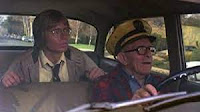



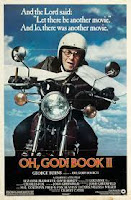
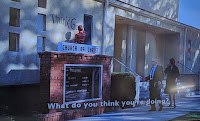
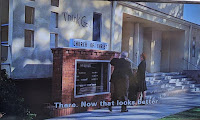
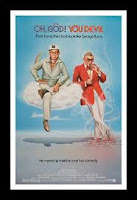
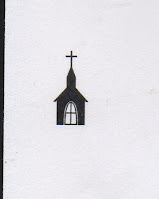


No comments:
Post a Comment